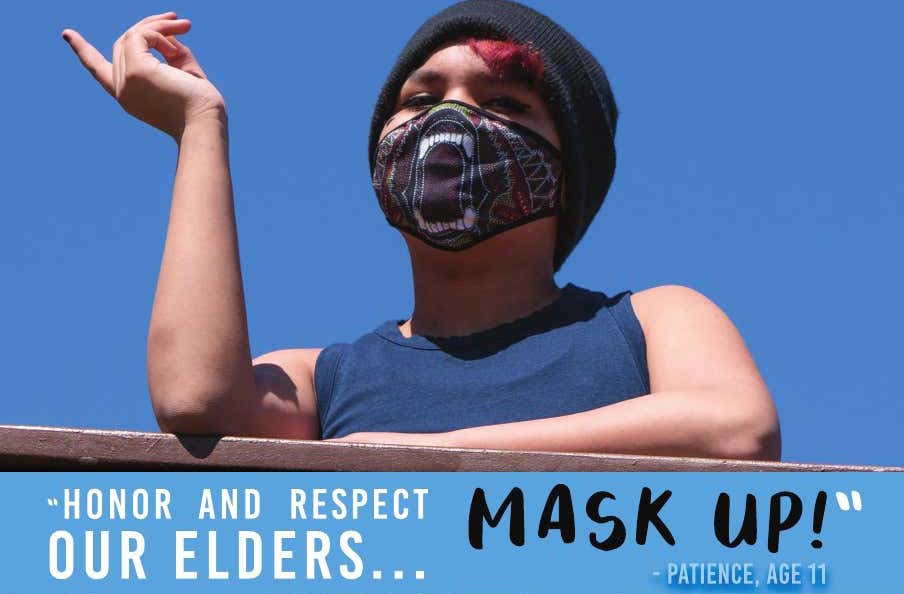This week on the Minnesota Native News Health Report, artists take a stand against Covid and more of your questions answered. Laurie Stern reports.
Moira Villiard (pronounced “Mee-Ree“) is an artist who grew up on Fond du Lac and works with the American Indian Community Housing Organization in Duluth. She’s built a website featuring downloadable posters, mask designs, and videos all made by and for indigenous people.
One of the videos features a song composed and performed by the Jaakola family. It’s called Couch Potato
One of the posters is a collaboration between Moira Villiard, a painter named Leah Yellowbird, and photographer Ivy Vainio:
“It features two photos of youth connected to AICHO’s housing programming, they’re wearing face masks that features sort of a roaring bear mouth. So it makes it look like the kids are, you know, pretending to be bears,” said Villiard. “And the mask itself was designed by another artist Leah Yellowbird. In the center, there’s a quote by one of the youth that describes how you know wearing a mask is a way to honor and respect your elders and protect them from COVID-19.”
Meeree Villiard says the process is many-layerd, but the products are simple and powerful messages that both protect and empower indigenous people.
“Most non-European languages don’t have a word for art. And like when I realized that it was just kind of like, you know, I don’t think a lot of the indigenous languages I don’t think Ojibwe there’s a word for art because most cultures don’t take art out of lifestyle like English does,” said Villiard.
If you’d like to see or download the coloring books, posters and mask designs, go to AICHO.org
—
“I belong to the Northern Arapaho and Kickapoo nations. And I am here on Franklin Avenue at the library and we’re working on a thank you mural for AIM and for the native community for protecting the avenue,” said Missy Whiteman.
Missy Whiteman is an award-winning filmmaker and mentor. She is not surprised at the explosion of public art.
“Quarantine time was our time to gather our medicine and it was our time to prepare and to learn to do things differently to reconnect with our families and our children,” said Whiteman, “To cook, to cook for our families and to become healthier, you know, physically, mentally, spiritually. And then now is the time where we feel like there’s more freedom to connect with one another because we’ve been quarantined and because of all the riots, we need human interaction to heal.”
—
We called on Dr. Nick Lehnertz from the Minnesota Department of Health to answer another of your questions about COVID-19 – this one about the incubation period.
“So the incubation period is the time from exposure to the virus to the time when you become symptomatic. When you’re exposed, you don’t instantaneously become ill. Now currently, the average incubation period that we’re seeing with COVID-19 is right around five to seven days. However, the range of incubation periods that we have seen has been anywhere from two to 12 days. And so airing on the side of caution after exposure to a known COVID positive case. Okay, so let’s say you’re at a party and there’s an individual there and he’s got COVID-19 and you’ve been exposed to him. That’s why the recommendations are to quarantine yourself or stay away from everybody else for 14 days,” said Lehnertz
Please let us know your questions about COVID-19. Just leave a message on our Facebook page or call 612 430 9368. Stay well my friends.


 Phase Three of Minnesota’s Stay-Safe Plan is Underway
Phase Three of Minnesota’s Stay-Safe Plan is Underway